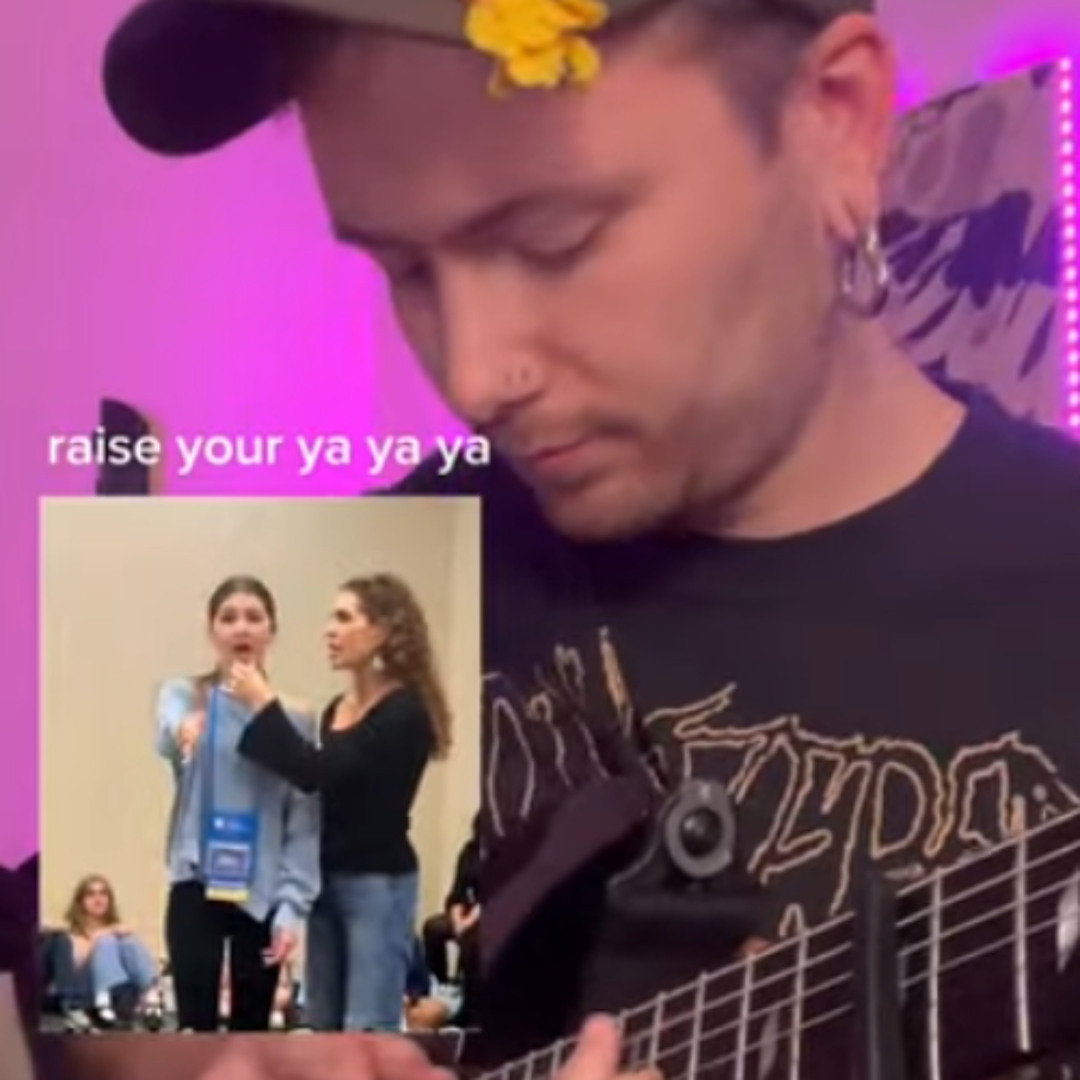Raise Your Ya Ya Ya - The Story Behind A Viral Sensation
There are these moments, you know, when something just clicks with everyone, spreading across screens and through conversations like wildfire. It's a rather fascinating thing to witness, how a small piece of content, perhaps a sound or a phrase, can suddenly become a shared experience for so many people. This kind of widespread interest, in a way, shows us how connected we all are, even when we're sitting miles apart.
One such moment that has captured the attention of many involves a catchy phrase that goes, "raise your ya ya ya." This particular expression, it turns out, began its life as a fun little challenge, something that invited people to join in and try it out for themselves. It's more than just an amusing trend, you see; it carries with it a sense of collective playfulness and a shared chuckle that travels far and wide.
The story behind this playful sound takes us to the world of vocal training and the spontaneous joy that can come from a simple lesson. It really highlights how a single, unexpected event can spark a wave of creativity and participation across the digital space. This kind of phenomenon, quite honestly, reminds us that joy can be found in the most straightforward and sometimes even delightfully odd places, bringing people together in unexpected ways.
Table of Contents
- The Person Behind the "Raise Your Ya Ya Ya" Sound
- What Makes a Moment Go Viral?
- How Do These Shared Experiences Connect Us?
- Why Do We Love to "Raise Our Ya Ya Ya"?
- The Ripple Effect of Internet Fun
- The Power of Playful Imitation
- What Can We Learn From These Digital Fads?
- Beyond the "Raise Your Ya Ya Ya" Trend - What Stays?
The Person Behind the "Raise Your Ya Ya Ya" Sound
Every widely shared moment often has an origin, a starting point that sets everything else in motion. For the "raise your ya ya ya" expression, that origin traces back to a particular individual who, in her professional capacity, happened to create something that resonated deeply with many. This person, as a matter of fact, is known for her work in helping voices find their strength and clarity, bringing a unique kind of skill to the table.
It's interesting to consider how someone's everyday work, something they do with dedication, can suddenly become a part of a much larger conversation. Her contribution, in a way, wasn't meant to become a widely recognized trend, but rather a simple teaching moment. Yet, that very authenticity, that straightforward approach to instruction, appears to be what gave it its special appeal and helped it spread so far.
Who is Jodie Langel?
The person at the heart of the "raise your ya ya ya" story is Jodie Langel. She is a vocal coach and also a Broadway actor, someone with a deep appreciation for the performing arts and the human voice. Her background in live theater, you see, gives her a special understanding of how to project sound and emotion, skills she shares with those she teaches. She has spent a good portion of her professional life helping others find their voice, literally and figuratively.
Jodie Langel is recognized for her ability to guide young performers, helping them to develop their singing abilities and stage presence. Her methods often involve practical, hands-on instruction, breaking down complex vocal techniques into manageable steps. It's this very approach, this dedication to helping students achieve their best, that led to the video that sparked the widespread "raise your ya ya ya" trend. She is, in essence, a mentor who helps people discover their own vocal capabilities.
Jodie Langel - Quick Facts
| Profession | Vocal Coach, Broadway Actor |
| Known For | Vocal training, work in musical theater, inspiring the "raise your ya ya ya" trend |
| Approach to Teaching | Practical, student-focused, encouraging |
| Impact | Helps students develop vocal strength and confidence |
What Makes a Moment Go Viral?
So, what exactly is it that causes certain pieces of content to become so widely shared, to really take hold of public attention? It's a question that many people ponder, and there isn't always one simple answer. Often, it seems to come down to a combination of factors, a mix of timing, emotion, and just the right amount of unexpectedness. A moment that goes viral, you know, often taps into something universal, something that many people can relate to or find amusing.
Sometimes, it's the sheer simplicity of the content that makes it so appealing. It doesn't require a lot of explanation or deep thought; it just is what it is, and that straightforwardness can be quite refreshing. Other times, it might be the element of surprise, something that catches people off guard and makes them smile or laugh. The ability to easily participate or recreate the content also plays a significant role, allowing many to become part of the ongoing fun.
The Spark of "Raise Your Ya Ya Ya"
The "raise your ya ya ya" trend, as a matter of fact, began with a video of Jodie Langel teaching a student. This video showed her guiding a young person at a Texas Thespians conference, helping them to really belt out certain words, specifically "right finger by." The moment itself was a genuine teaching interaction, a glimpse into the process of learning to sing with power. It was, perhaps, the earnestness of the student and the supportive guidance of the coach that made it so captivating.
This single video, then, became the initial spark. People saw it, they found it charming or funny, and they started to share it. The phrase "raise your ya ya ya" became a sort of shorthand for that moment, an invitation to recreate the vocal exercise in a playful way. It shows, in a way, how a teaching session, something quite ordinary in its context, can become something quite extraordinary when shared widely.
How Do These Shared Experiences Connect Us?
When something like the "raise your ya ya ya" trend spreads, it does more than just entertain; it actually helps to build connections between people. Think about it: when you see someone else doing the same funny thing, or using the same playful phrase, there's an instant sense of recognition, a shared understanding. This collective participation, you see, creates a kind of informal community, even if it's just for a fleeting moment.
These shared experiences can bridge distances, allowing people from different places to feel a part of something together. It's like an inside joke that everyone is suddenly in on, creating a feeling of belonging. Whether it's through watching videos, making their own versions, or simply talking about it, people find common ground. This common ground, in a way, reminds us that despite our differences, we often share a similar sense of humor and a desire for lighthearted fun.
Why Do We Love to "Raise Our Ya Ya Ya"?
There's something about these simple, repeatable actions or sounds that really appeals to us. Why do we find ourselves drawn to joining in on something like "raise your ya ya ya"? Part of it, perhaps, is the sheer joy of play. As people, we often look for ways to lighten our days, to find moments of carefree amusement. These trends provide just that, a chance to step away from the serious stuff and just have a bit of fun.
It also offers a low-stakes way to express creativity. You don't have to be a professional performer or a skilled creator to participate in a trend like this; you just need to be willing to give it a try. This accessibility, you know, makes it very inviting. And then there's the social aspect: seeing others participate, and knowing you're part of that collective experience, can be quite satisfying. It's a way to feel connected, to feel like you're in on something special with many others.
The Ripple Effect of Internet Fun
Once a trend takes hold, its influence can spread far beyond its initial point of origin. The "raise your ya ya ya" sound, for instance, didn't just stay with the original video; it moved across different accounts and platforms, getting picked up by various creators. We saw references to accounts like @duolingo, @aussiebrosquad, @jodie_langel, and @unghettomathieu, which suggests how different corners of the internet can get involved. This spread, in a way, shows the interconnectedness of online communities.
It's like dropping a pebble into a pond; the ripples just keep going outwards. A simple sound or phrase can inspire countless new creations, variations, and interpretations. People might put their own spin on it, add a new layer of humor, or combine it with other popular elements. This constant reinterpretation, you know, keeps the trend alive and helps it to reach an even broader audience, creating a continuous chain of shared amusement.
The Power of Playful Imitation
A big part of why trends like "raise your ya ya ya" become so popular is the human tendency to imitate, especially when it's done in a lighthearted or humorous way. There's a certain satisfaction that comes from recreating something you've seen and enjoyed, putting your own personal touch on it. This act of imitation, in a way, is a form of participation, a way to signal that you understand the joke or the appeal of the original content.
This isn't about copying exactly; it's more about playful mimicry. It allows people to express themselves within a shared framework, adding their unique personality to a collective activity. This kind of shared play, you see, helps to strengthen social bonds and create a sense of belonging. It's a simple, yet powerful, mechanism for building community and spreading joy through creative expression.
What Can We Learn From These Digital Fads?
Looking at trends like "raise your ya ya ya," or even others like "in da clurb, we all fam" or "then i go & spoil it all," offers us a glimpse into the nature of online culture. What insights can we gather from these fleeting moments of collective interest? For one thing, they show us that simplicity often wins. Content that is easy to grasp, easy to share, and easy to participate in tends to have a much wider reach. It doesn't need to be overly produced or complex; sometimes, a straightforward idea is all it takes.
These fads also highlight the human desire for connection and shared experience. We are, you know, social creatures, and even in the digital space, we seek out ways to feel connected to others. Participating in a trend, even a silly one, can provide that sense of belonging, that feeling of being part of something larger than ourselves. They remind us that humor and play are universal languages, capable of bringing people together from all walks of life, just by being themselves.
Beyond the "Raise Your Ya Ya Ya" Trend - What Stays?
While specific trends like "raise your ya ya ya" might eventually fade from the most active conversations, the impact they have, and the lessons they offer, can last much longer. What remains is the understanding of how a simple act of teaching, or a moment of genuine expression, can unexpectedly become a source of widespread amusement and connection. It's a testament, you see, to the unpredictable nature of creativity and how it can touch many lives.
The core idea that delightfully odd or simple content can capture massive attention on social platforms continues to hold true. These moments remind us that authenticity, a touch of humor, and an open invitation to participate are often the ingredients for something truly special. They show us, in a way, that the most powerful connections sometimes come from the most unexpected and lighthearted places, leaving a lingering feeling of shared joy.
Article Recommendations



Detail Author:
- Name : Ms. Tabitha Bernhard IV
- Username : vankunding
- Email : diego.lind@yahoo.com
- Birthdate : 1988-04-29
- Address : 727 Sheridan Centers Jonesshire, KY 41327
- Phone : 720-538-7916
- Company : Gulgowski, Kling and Collier
- Job : Procurement Clerk
- Bio : Voluptas facere harum mollitia quae assumenda. Adipisci nostrum excepturi dolorem rem dolorem tempora. Repudiandae repudiandae perferendis in. Enim est provident libero eaque non inventore.
Socials
twitter:
- url : https://twitter.com/reinhold6751
- username : reinhold6751
- bio : Sed dolores velit vitae et repellendus culpa. Laborum quae voluptatibus assumenda dolorum. Quia quia quia dolorem totam aut. Error aut qui quis sunt nostrum.
- followers : 5994
- following : 2967
linkedin:
- url : https://linkedin.com/in/reinhold_monahan
- username : reinhold_monahan
- bio : Ipsam qui tempora exercitationem.
- followers : 6803
- following : 1075
instagram:
- url : https://instagram.com/reinhold.monahan
- username : reinhold.monahan
- bio : Libero et iste libero et earum. Facilis qui a temporibus velit velit voluptatem aut.
- followers : 3876
- following : 494
tiktok:
- url : https://tiktok.com/@rmonahan
- username : rmonahan
- bio : Nam nisi ratione quis. Blanditiis dolorem asperiores commodi non saepe ea sunt.
- followers : 2903
- following : 2436